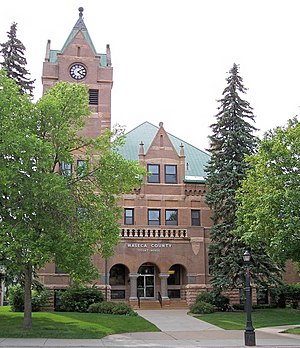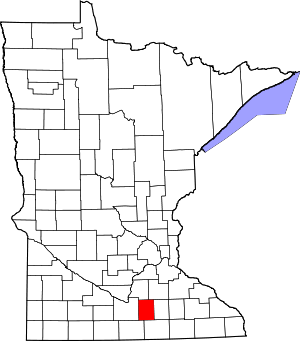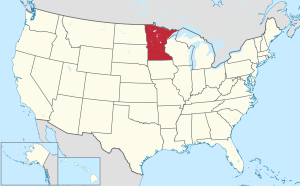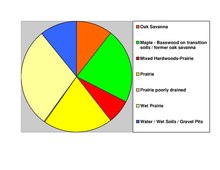Waseca County, Minnesota
Waseca County | |
|---|---|
 Waseca County Courthouse in 2007 | |
 Location within the U.S. state of Minnesota | |
 Minnesota's location within the U.S. | |
| Coordinates: 44°01′N 93°35′W / 44.02°N 93.59°W | |
| Country | |
| State | |
| Founded | February 27, 1857[1] |
| Named for | Waseca (settlement) |
| Seat | Waseca |
| Largest city | Waseca |
| Area | |
• Total | 433 sq mi (1,120 km2) |
| • Land | 423 sq mi (1,100 km2) |
| • Water | 9.6 sq mi (25 km2) 2.2% |
| Population (2020) | |
• Total | 18,968 |
• Estimate (2023) | 18,981 |
| • Density | 44/sq mi (17/km2) |
| Time zone | UTC−6 (Central) |
| • Summer (DST) | UTC−5 (CDT) |
| Congressional district | 1st |
| Website | www |
Waseca County (/wəˈsiːkə/)[2] is a county in the U.S. state of Minnesota. As of the 2020 census, the population was 18,968.[3] Its county seat is Waseca.[4]
History
[edit]In 1849, the newly organized Minnesota Territory legislature authorized nine counties across the territory. One of those, Dakota, was partially subdivided in 1853 to create Blue Earth, Le Sueur, and Rice counties. In 1855, parts of those counties were partitioned to create Steele. On February 27, 1857, the territorial legislature authorized partitioning western Steele County to create Waseca County, with its seat at Wilton, a settlement which began in 1854. The county name was taken from the area's first farming settlement, started in 1855, near the present location of the city of Waseca. That settlement name came from the Dakota word meaning "rich," a reference to the fertile soil in the area.
The Winona and Saint Peter Railroad line past the town of Waseca was completed in the latter half of the 1860s, causing the town to bloom. By 1870 the vote was taken to relocate the county seat to that settlement.[5]
Waseca County's boundaries have not changed since its creation.
Geography
[edit]
The Le Sueur River flows westward through the county toward its confluence with the Blue Earth River in Blue Earth County. It is augmented by the Little Le Sueur, which drains the southeast part of the county. Bull Run Creek flows westward from Silver Lake through the lower central part of the county into Blue Earth County; the Little Cobb River rises in southern Waseca County and flows westward into Blue Earth County to its confluence with the Cobb River.
The county terrain consists of low rolling hills, carved by drainages and dotted with lakes. The area is devoted to agriculture wherever possible.[7] The terrain slopes to the north and west, with its highest point near its southeast corner, at 1,240 ft (380 m) ASL.[8] The county has an area of 433 square miles (1,120 km2), of which 423 square miles (1,100 km2) is land and 9.6 square miles (25 km2) (2.2%) is water.[9]
Waseca is one of seven southern Minnesota counties that have no forest ecosystems, only prairie and savanna soils.
Transit
[edit]Major highways
[edit] U.S. Highway 14
U.S. Highway 14 Minnesota State Highway 13
Minnesota State Highway 13 Minnesota State Highway 30
Minnesota State Highway 30 Minnesota State Highway 60 (runs along north border of county only)
Minnesota State Highway 60 (runs along north border of county only) Minnesota State Highway 83
Minnesota State Highway 83- Minnesota State Highway 230
Adjacent counties
[edit]- Rice County - northeast
- Steele County - east
- Freeborn County - southeast
- Faribault County - southwest
- Blue Earth County - west
- Le Sueur County - northwest
- Findley State Wildlife Management Area
- Kanne State Wildlife Management Area
- Moonan State Wildlife Management Area
- Mueller State Wildlife Management Area
- Senn-Rich State Wildlife Management Area
- Teal State Wildlife Management Area
- Waseca State Wildlife Management Area
- Buffalo Lake
- Clear Lake
- Everson Lake
- Goose Lake
- Hayes Lake
- Knutsen Lake
- Lake Elysian (part)
- Lilly Lake
- Lily Lake (part)
- Loon Lake
- Mott Lake
- Reeds Lake
- Reese Lake
- Rice Lake (Janesville Township)
- Rice Lake (Woodville Township)
- Saint Olaf Lake
- Sibert Lake
- Silver Lake
- Toners Lake
- Trenton Lake (part)
- Watkins Lake
Demographics
[edit]| Census | Pop. | Note | %± |
|---|---|---|---|
| 1860 | 2,601 | — | |
| 1870 | 7,854 | 202.0% | |
| 1880 | 12,385 | 57.7% | |
| 1890 | 13,313 | 7.5% | |
| 1900 | 14,760 | 10.9% | |
| 1910 | 13,466 | −8.8% | |
| 1920 | 14,133 | 5.0% | |
| 1930 | 14,412 | 2.0% | |
| 1940 | 15,186 | 5.4% | |
| 1950 | 14,957 | −1.5% | |
| 1960 | 16,041 | 7.2% | |
| 1970 | 16,663 | 3.9% | |
| 1980 | 18,448 | 10.7% | |
| 1990 | 18,079 | −2.0% | |
| 2000 | 19,526 | 8.0% | |
| 2010 | 19,136 | −2.0% | |
| 2020 | 18,968 | −0.9% | |
| 2023 (est.) | 18,981 | [10] | 0.1% |
| U.S. Decennial Census[11] 1790-1960[12] 1900-1990[13] 1990-2000[14] 2010-2020[3] | |||
2020 Census
[edit]| Race | Num. | Perc. |
|---|---|---|
| White (NH) | 16,538 | 87.2% |
| Black or African American (NH) | 336 | 1.8% |
| Native American (NH) | 114 | 0.6% |
| Asian (NH) | 111 | 0.6% |
| Pacific Islander (NH) | 12 | 0.06% |
| Other/Mixed (NH) | 586 | 3.1% |
| Hispanic or Latino | 1,271 | 6.7% |
2000 census
[edit]
As of the census of 2000, there were 19,526 people, 7,059 households, and 4,990 families in the county. The population density was 46.2 per square mile (17.8/km2). There were 7,427 housing units at an average density of 17.6 per square mile (6.8/km2). The racial makeup of the county was 94.65% White, 2.26% Black or African American, 0.59% Native American, 0.46% Asian, 0.03% Pacific Islander, 1.29% from other races, and 0.71% from two or more races. 2.90% of the population were Hispanic or Latino of any race. 47.6% were of German, 15.5% Norwegian, 7.4% Irish and 5.5% American ancestry.
There were 7,059 households, of which 34.7% had children under the age of 18 living with them, 59.0% were married couples living together, 7.8% had a female householder with no husband present, and 29.3% were non-families. 25.1% of all households were made up of individuals, and 10.70% had someone living alone who was 65 or older. The average household size was 2.56 and the average family size was 3.07.
The county population contained 25.8% under 18, 8.7% from 18 to 24, 30.0% from 25 to 44, 21.3% from 45 to 64, and 14.2% who were 65 or older. The median age was 36. For every 100 females there were 109.3 males. For every 100 females 18 and over, there were 111.3 males.
The median income for a household in the county was $42,440, and the median income for a family was $50,081. Males had a median income of $34,380 versus $22,630 for females. The per capita income was $18,631. About 4.5% of families and 6.5% of the population were below the poverty line, including 8.8% of those under 18 and 5.8% of those 65 or over.
Communities
[edit]Cities
[edit]- Elysian (part)
- Janesville
- New Richland
- Waldorf
- Waseca (county seat)
Unincorporated communities
[edit]Townships
[edit]Politics
[edit]Waseca County has traditionally voted Republican. In only three presidential elections since 1936 has the county selected the Democratic nominee (as of 2024).
| Position | Name | Affiliation | District | |
|---|---|---|---|---|
| Senate | Julie Rosen[16] | Republican | District 23 | |
| Senate | John Jasinski[17] | Republican | District 24 | |
| House of Representatives | Jeremy Munson[18] | Republican | District 23B | |
| House of Representatives | John Petersburg[19] | Republican | District 24A | |
| Position | Name | Affiliation | District | |
|---|---|---|---|---|
| House of Representatives | Brad Finstad[20] | Republican | 1st | |
| Senate | Amy Klobuchar[21] | Democrat | N/A | |
| Senate | Tina Smith[22] | Democrat | N/A | |
| Year | Republican | Democratic | Third party(ies) | |||
|---|---|---|---|---|---|---|
| No. | % | No. | % | No. | % | |
| 2024 | 6,770 | 65.18% | 3,402 | 32.75% | 215 | 2.07% |
| 2020 | 6,624 | 63.76% | 3,496 | 33.65% | 269 | 2.59% |
| 2016 | 5,967 | 61.81% | 2,838 | 29.40% | 848 | 8.78% |
| 2012 | 5,116 | 52.49% | 4,370 | 44.83% | 261 | 2.68% |
| 2008 | 5,211 | 52.70% | 4,401 | 44.51% | 276 | 2.79% |
| 2004 | 5,457 | 55.68% | 4,179 | 42.64% | 164 | 1.67% |
| 2000 | 4,608 | 51.99% | 3,694 | 41.67% | 562 | 6.34% |
| 1996 | 3,171 | 37.43% | 3,819 | 45.08% | 1,482 | 17.49% |
| 1992 | 3,118 | 34.62% | 3,146 | 34.93% | 2,742 | 30.45% |
| 1988 | 4,471 | 53.95% | 3,721 | 44.90% | 95 | 1.15% |
| 1984 | 5,509 | 60.60% | 3,527 | 38.80% | 55 | 0.60% |
| 1980 | 4,801 | 51.62% | 3,535 | 38.01% | 965 | 10.38% |
| 1976 | 4,582 | 52.04% | 4,002 | 45.45% | 221 | 2.51% |
| 1972 | 5,064 | 63.89% | 2,767 | 34.91% | 95 | 1.20% |
| 1968 | 4,292 | 56.44% | 3,057 | 40.20% | 256 | 3.37% |
| 1964 | 3,570 | 49.47% | 3,633 | 50.34% | 14 | 0.19% |
| 1960 | 4,838 | 63.36% | 2,793 | 36.58% | 5 | 0.07% |
| 1956 | 4,663 | 67.69% | 2,215 | 32.15% | 11 | 0.16% |
| 1952 | 4,962 | 69.76% | 2,132 | 29.97% | 19 | 0.27% |
| 1948 | 3,511 | 52.56% | 3,120 | 46.71% | 49 | 0.73% |
| 1944 | 4,146 | 65.04% | 2,207 | 34.62% | 22 | 0.35% |
| 1940 | 4,515 | 62.60% | 2,673 | 37.06% | 25 | 0.35% |
| 1936 | 2,482 | 39.10% | 3,520 | 55.45% | 346 | 5.45% |
| 1932 | 2,012 | 34.08% | 3,805 | 64.46% | 86 | 1.46% |
| 1928 | 3,251 | 56.94% | 2,418 | 42.35% | 41 | 0.72% |
| 1924 | 2,081 | 37.13% | 442 | 7.89% | 3,082 | 54.99% |
| 1920 | 3,626 | 71.79% | 1,257 | 24.89% | 168 | 3.33% |
| 1916 | 1,522 | 54.11% | 1,178 | 41.88% | 113 | 4.02% |
| 1912 | 553 | 20.53% | 1,062 | 39.42% | 1,079 | 40.05% |
| 1908 | 1,455 | 54.99% | 1,085 | 41.01% | 106 | 4.01% |
| 1904 | 1,714 | 70.13% | 631 | 25.82% | 99 | 4.05% |
| 1900 | 1,744 | 58.46% | 1,155 | 38.72% | 84 | 2.82% |
| 1896 | 1,902 | 58.79% | 1,244 | 38.45% | 89 | 2.75% |
| 1892 | 1,090 | 44.86% | 1,042 | 42.88% | 298 | 12.26% |
See also
[edit]References
[edit]- ^ "Minnesota Place Names". Minnesota Historical Society. Retrieved March 19, 2014.
- ^ "5 More Minnesota Towns You're Pronouncing Wrong".
- ^ a b "State & County QuickFacts". United States Census Bureau. Retrieved April 19, 2023.
- ^ "Find a County". National Association of Counties. Retrieved June 7, 2011.
- ^ Upham, Warren (1920). Minnesota Geographic Names: Their Origin and Historic Significance. Minnesota Historical Society. p. 564. Retrieved April 22, 2019.
- ^ Nelson, Steven (2011) Savanna Soils of Minnesota. Minnesota: Self. pp. 43-48. ISBN 978-0-615-50320-2.
- ^ a b c Waseca County MN Google Maps (accessed April 22, 2019)
- ^ "Find an Altitude/Waseca County MN" Google Maps (accessed April 22, 2019)
- ^ "2010 Census Gazetteer Files". United States Census Bureau. August 22, 2012. Archived from the original on October 6, 2014. Retrieved October 25, 2014.
- ^ "Annual Estimates of the Resident Population for Counties: April 1, 2020 to July 1, 2023". Retrieved March 18, 2024.
- ^ "U.S. Decennial Census". United States Census Bureau. Retrieved October 25, 2014.
- ^ "Historical Census Browser". University of Virginia Library. Retrieved October 25, 2014.
- ^ "Population of Counties by Decennial Census: 1900 to 1990". United States Census Bureau. Retrieved October 25, 2014.
- ^ "Census 2000 PHC-T-4. Ranking Tables for Counties: 1990 and 2000" (PDF). United States Census Bureau. Archived (PDF) from the original on March 27, 2010. Retrieved October 25, 2014.
- ^ "P2 HISPANIC OR LATINO, AND NOT HISPANIC OR LATINO BY RACE – 2020: DEC Redistricting Data (PL 94-171) – Waseca County, Minnesota".
- ^ "MN State Senate". www.senate.mn. Retrieved June 25, 2020.
- ^ "MN State Senate". www.senate.mn. Retrieved April 18, 2021.
- ^ "Rep. Jeremy Munson (23B) - Minnesota House of Representatives". www.house.leg.state.mn.us. Retrieved April 18, 2021.
- ^ "Rep. John Petersburg (24A) - Minnesota House of Representatives". www.house.leg.state.mn.us. Retrieved April 18, 2021.
- ^ "Republican Rep. Brad Finstad sworn in to finish Hagedorn's House term". August 12, 2022.
- ^ "U.S. Senator Amy Klobuchar". www.klobuchar.senate.gov. Retrieved June 24, 2020.
- ^ "Home". Senator Tina Smith. Retrieved June 24, 2020.
- ^ Leip, David. "Atlas of US Presidential Elections". uselectionatlas.org. Retrieved October 10, 2018.
- ^ The leading "other" candidate, Progressive Theodore Roosevelt, received 940 votes, while Socialist candidate Eugene Debs received 63 votes, Prohibition candidate Eugene Chafin received 62 votes, and Socialist Labor candidate Arthur Reimer received 14 votes.

